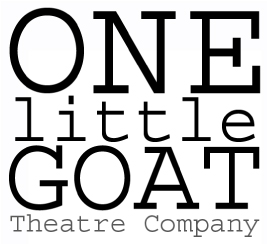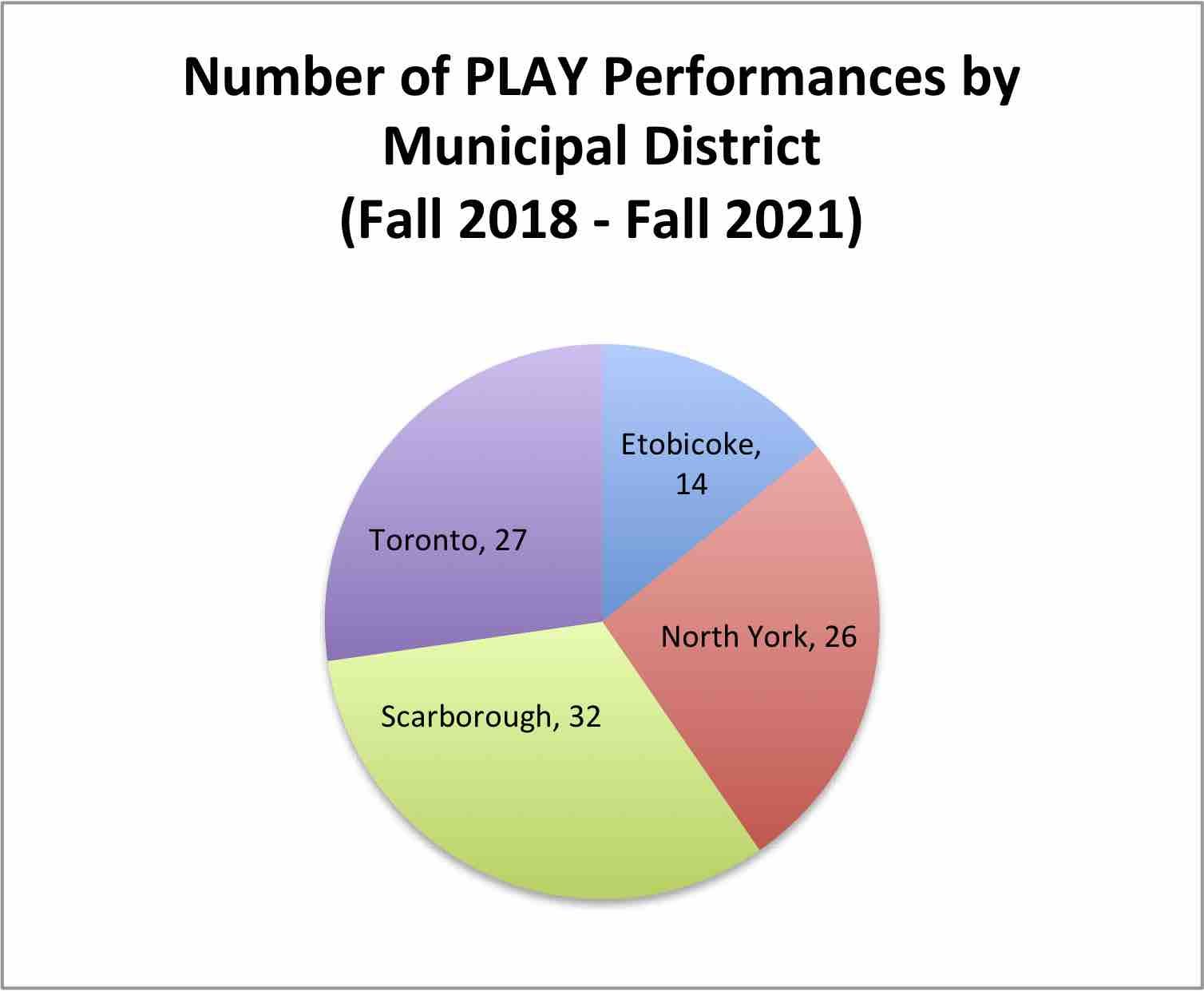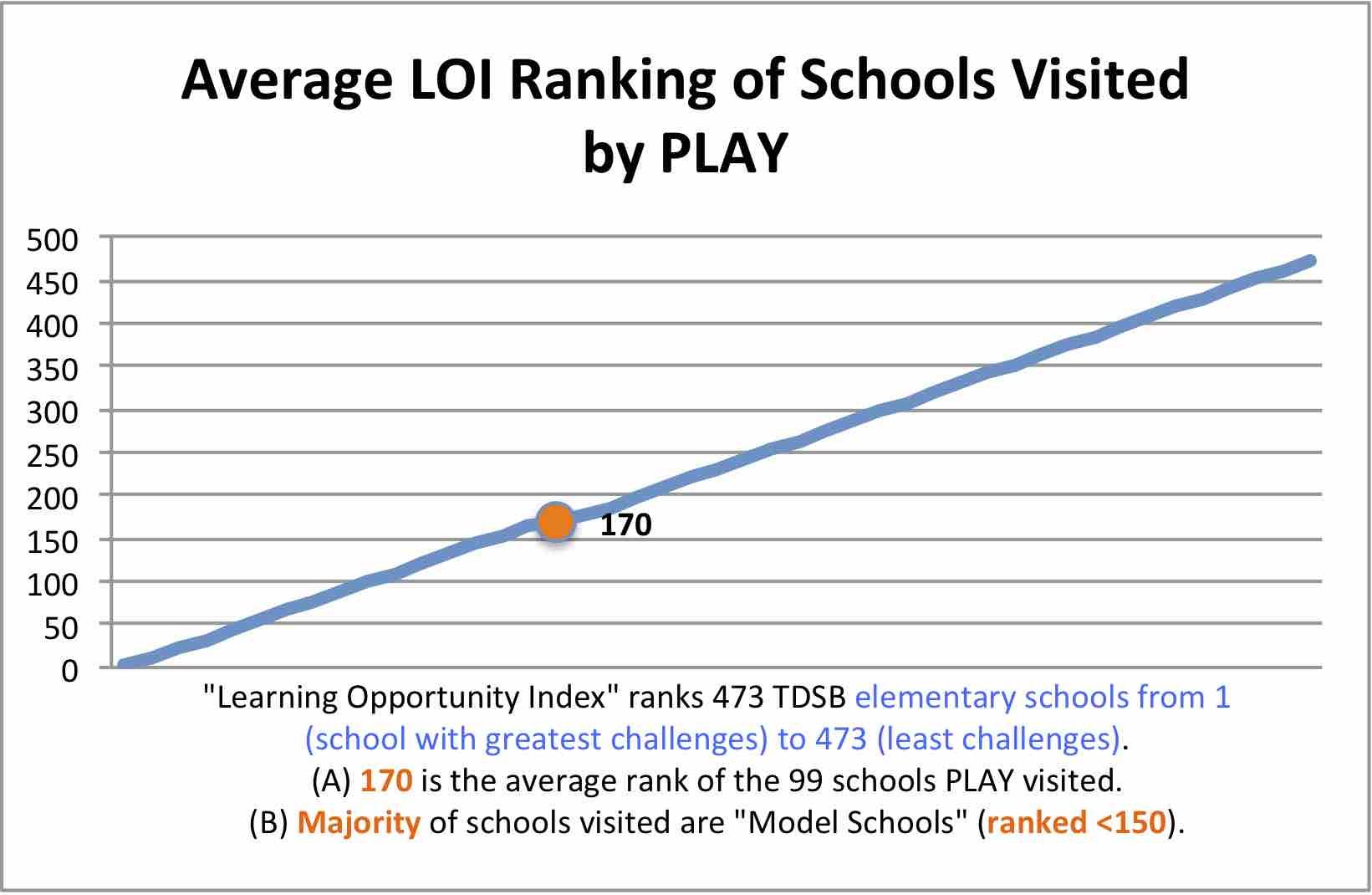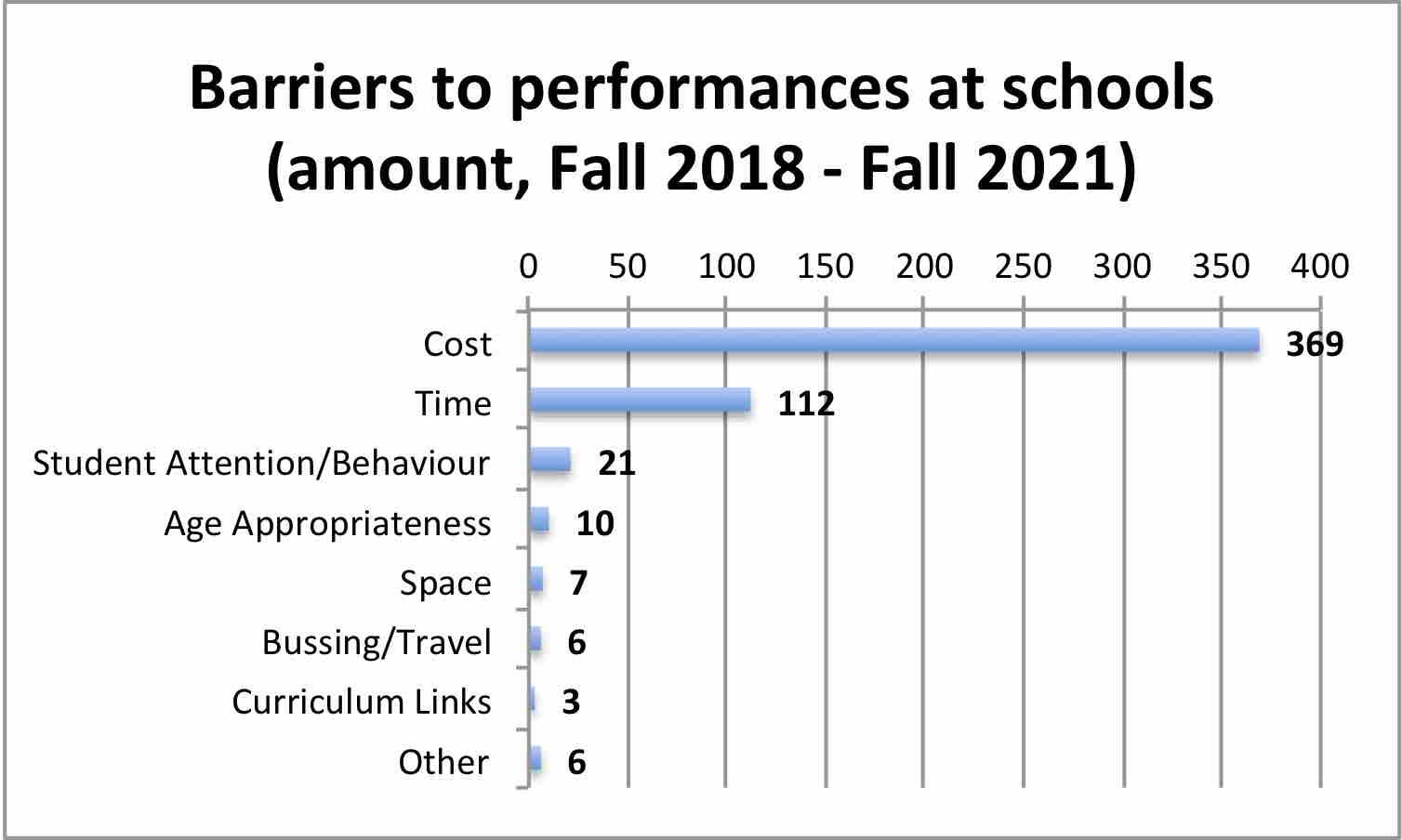Note from the Artistic Director
From grades five to seven (1985-88), I went to Osler Elementary School in Vancouver, where, on a couple of occasions, a small opera troupe visited and performed in our school gym. I can’t remember the ‘take-home messages’ of those performances, if they even had one, but I definitely remember their energy and spirit. Here, very much alive in front of me, was a group of people singing, moving and playing together dynamically and, in every sense of the word, harmoniously. They made an impression on me, and for all the theatres I’ve attended since, the gym floor of Sir William Osler might remain the most influential. It is with those experiences in mind, and thinking of my own children, that I wrote PLAY: A (Mini) History of Theatre for Kids.
— Adam Seelig
Two Highlights from the Report
One Little Goat prepared a version of this report for the Ontario Trillium Foundation in December of 2021. Two highlights from the 99 schools we surveyed:
1. Nearly 60% of schools attend no (“Ø”) live performances in a given year.
2. Cost is the biggest barrier to performances for nearly 70% of schools.
Background
From 2018 to 2021 — with a break from spring 2019 to fall 2021 due to the pandemic — One Little Goat Theatre Company presented PLAY: A (Mini) History of Theatre for Kids in 99 elementary schools in the Toronto District School Board, covering Etobicoke, North York, Scarborough and Toronto and reaching nearly 27,000 students and educators at no cost to the schools (thanks to support from the Ontario Trillium Foundation and Friends of One Little Goat Theatre Company). The majority of these elementary schools were schools “with the greatest level of external challenges” (as assessed by the TDSB), known as Model Schools for Inner Cities. The majority of students were in Grades 1-6, with many performances also including Kindergarten and the occasional performance including Grade 7.
Since 2015, actors Rochelle Bulmer, Richard Harte and Jessica Salgueiro and writer-director Adam Seelig worked in production with One Little Goat to bring PLAY to over 36,000 students and educators in 140 schools. This report addresses the nearly 27,000 in 99 schools since 2018, the year we began collecting surveys from teachers.
Written, composed and directed by One Little Goat’s Artistic Director Adam Seelig, PLAY makes the case that dramatic play is rooted in childhood games, empowering children as natural-born play-makers. Through PLAY, actors Richard Harte and “Mavis-the-Sometimes-Cat” (Rochelle Bulmer alternating with Jessica Salgueiro) introduce elementary students to some of the world’s most enduring games we call “plays.” For more on PLAY, including the script and guide for educators, please visit the PLAY page.
One Little Goat distributed a pen-and-paper survey to teachers and principals at the conclusion of each presentation. We received over 500 responses and collected the data for this report. The evaluation helped us measure the effectiveness of our program along the way. For example, after our first quarter of performances, we noticed — from teacher evaluation comments and from our own observations during performances — that students were especially responsive to the songs in PLAY, so we added more music to the presentation for the second quarter onward.
The evaluation also demonstrates:
(A) the access PLAY provides to elementary student and teacher/educator populations, primarily in Model Schools;
(B) the level of engagement PLAY engenders in students.
PLAY during the pandemic: performing outside
Prior to the pandemic, One Little Goat performed PLAY in school gyms, completing 3/4 of our tour (fall 2018, spring 2019, fall 2019). When the pandemic hit, we postponed the last quarter of our program delivery until we could safely resume in-person performances in the fall of 2021, which we managed by performing PLAY outside in each school’s play area/schoolyard. While outdoor theatre presented significant challenges for PLAY — rain-outs, wind, cold, noise (e.g. nearby traffic and construction), wet or sandy concrete schoolyards (which we covered in tarps for students to sit more comfortably), uneven ‘stage’ for the actors, separating students by cohort in light of COVID, etc. — this fourth quarter of the PLAY tour was immensely rewarding, particularly in being each school’s first live-and-in-person event since (at least) the start of the pandemic. As several principals told us, after over a year of “remote learning” and cohorting (keeping classes separate, even at recess, to impede the spread of COVID-19), PLAY marked the first time they had seen their entire school together. It was for them, and for us, a meaningful and moving sight, and we were honoured that One Little Goat, through theatre, could facilitate such shared experiences after over a year of isolation.
Note that we opted not to “pivot” (a popular term at the height of the pandemic) to a digital delivery of PLAY, feeling that a live, in-person experience was far more engaging and beneficial to the students and teachers than a filmed version. We are grateful that the Trillium Foundation worked with us to accommodate this COVID-induced delay.
During our pandemic-era performances — held outdoors in the fall of 2021 — we did not distribute paper surveys after each performance. This helped us maintain physical distance, as encouraged by Toronto Public Health. Furthermore, the answer to one of the survey questions, “How many live theatrical performances has your school/class attended in the past 12 months?” was clearly “0” for every school in the TDSB in light of the pandemic. Still, numerous principals offered feedback for PLAY — here, for example, is the Principal of Carleton Village Public School:
“The play was fantastic! The kids were excited during and after. In our School Council meeting that evening a parent mentioned that her kindergarten daughter was talking about Antigone [the Ancient Greek Tragedy included in PLAY] after the play. How amazing is that? The students got the opportunity to experience theatre under the sky (outside) which was such a treat in light of the ban on co-curriculars due to the pandemic. The troupe was funny, and relatable. We are so appreciative of this opportunity that was given to us, at no cost.”
One Little Goat Theatre Company would like to add that sharing with young audiences some of the greatest moments in theatre, from the intensity of Ancient Greek tragedy to the absurdity of 20th-century modernism, was tremendously rewarding for us. All the learning, listening, laughing, miming and mask-wearing we did together with elementary students and educators in their gyms and schoolyards will contribute to the kids’ lifelong love of, and participation in, the arts.
REPORT ON PLAY
Aggregate data from >500 evaluation surveys by elementary school teachers and educators
A. Access PLAY Provides Students & Educators
Dates: 2018 - 2021 (Fall 2018, Spring 2019, Fall 2019, Pandemic Break, Fall 2021)
Number of Students & Educators (K-6) who Experienced PLAY
Total: 26,739
Fall 2018: 8,108
Spring 2019: 5,875
Fall 2019: 8,053
Fall 2021: 4,703
Number of PLAY Performances (2018-2021)
Total: 99
Fall 2018: 25
Spring 2019: 24
Fall 2019: 28
Fall 2021: 22
Location of Schools where One Little Goat performed PLAY
Total: 99
Etobicoke: 14
North York: 26
Scarborough: 32
Toronto: 27
Learning Opportunity Index (2018-2021) — Of the 99 schools where One Little Goat brought PLAY, what is the average school ranking on the Toronto District School Board’s LOI?
Average LOI: 170
The highest ranking school in the school board, #1, is considered by the school board to be “the school with the greatest level of external challenges,” while the lowest ranking school, #473, experiences the least level of external challenges
The majority of schools visited by PLAY are designated by the school board as Model Schools for Inner Cities, i.e. schools with a LOI ranking of 1 to 150
How many live theatrical performances has your school/class attended in the past 12 months?
426 responses
0: 58%
1: 26%
2: 12%
3: 4%
What are some of the barriers to having performances like PLAY at your school?
450 responses, with some teachers listing multiple barriers
Note: survey responses to this question were not collected during the pandemic performances, fall 2021, at which time COVID-19 was far and away the main barrier to performances in schools
Cost: 69%
Time: 22%
Student Attention/Behaviour: 12%
Age Appropriateness: 2%
Other: 3%
Below is a chart of barriers by number of survey responses.
B. Student Engagement with PLAY
On a scale of 1-5, how engaged were your students by PLAY? (1 = not engaged; 5 = very engaged)
519 responses
Note: survey responses to this question were not collected during the pandemic performances, fall 2021
1: 0 (0%)
2: 10 (2%)
3: 138 (27%)
4: 224 (43%)
5: 147 (28%)
Enhancing student engagement:
pre-performance introduction by One Little Goat
post-performance student mask and mime exercise conducted by One Little Goat
post-performance Q&A led by One Little Goat
music & songs
high calibre of the performers
PLAY resource/learning guide (incl. activities, vocabulary, etc.) freely accessible to teachers
PLAY published script freely accessible online for educators
What was a moment from PLAY that stuck with you and/or your students?
451 responses
Top words:
music (89), singing (60), safe/free (49), songs (45), mask (38), play (38) cat (28), guitar (26), students (26), playing (24), enjoyed (17), old woman (17), Antigone (16), miming (16), freedom (15), instruments (14), comedy (12), ukulele (12), actors (11), musical (11), Godot (10), acting (10), character (10), mime (10) …
ACKNOWLEDGEMENTS
The writing of PLAY was supported by an Ontario Arts Council Theatre Creators’ Reserve grant recommended by Theatre Direct in 2015.
Thank you to the organizations that supported One Little Goat Theatre Company’s development and production of PLAY: A (Mini) History of Theatre for Kids: Toronto Arts Council, Ontario Arts Council, Canada Council for the Arts, TD Bank, Embassy of Ireland in Ottawa, Irish Cultural Society of Toronto and the Ontario Trillium Foundation and Friends of One Little Goat, the last two of which deserve special thanks for enabling One Little Goat to bring PLAY to elementary schools, particularly Model Schools for Inner Cities, throughout Toronto, Etobicoke, North York and Scarborough from 2016-2021 at no cost to the schools.
Thank you to the many principals, teachers and students who have welcomed PLAY into your school.









